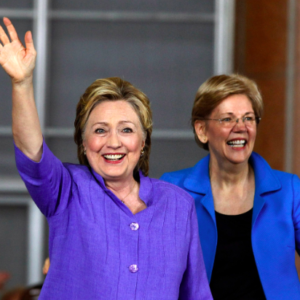Editor’s Note: For an alternative viewpoint, please see: Point: Likability Always Matters.
Standing in her kitchen, describing how her family struggled to make ends meet after her dad got sick and her mother worked a minimum wage job, she reinforced her commitment to fighting for vulnerable families and made a historic announcement: “…Today I’m launching an exploratory committee for president.”
And cue the media response.
Mere hours after Elizabeth Warren kicked off the 2020 presidential election cycle on New Year’s Eve with her announcement video, a flurry of media headlines danced across Twitter proposing that pesky, sexist question that’s long haunted girls and women acting with agency and gaining success: “… But is she likable?”
Instead of focusing on the senator’s accomplishments, policy ideas and vision for our nation, news outlets like Politico, The Daily Beast and many others pounced at the opportunity to evaluate Warren’s likability. They proceeded to describe her as “a combination of some of the horrible math teachers I endured in middle school, and a friend’s overly emotional mom …” and commented that “she’s already falling in the polls, and — perhaps most stinging — shares too many of the attributes that sank Hillary Clinton.”
Patriarchy strikes again.
I love that song, don’t you? You know the one where the patriarchy rears its head and attempts to force women into the submissive position of maintaining and advancing its principles with a smile on their faces?
Growing up in Tennessee, adults in my community stressed that it was more important to be liked than to be right or to fight and be heard; that little girls don’t get dirty or scrape their knees playing sports. By the time I was 12 years old, I’d lost count of all the “bless your hearts” I heard while fighting for leadership positions on student council and on sports teams, and challenging my middle school teachers’ differing expectations for girls and boys. It’s a travesty that these antiquated notions remain the foundation of the political fodder greasing the doldrums of the news cycle and serving as, essentially, the narrative that never died.
But enough is enough, because today, women are pushing to the front at every level of elected office and public service. Women led the blue wave in 2018 that resulted in Democrats reclaiming the House of Representatives, and 102 women — a record number — currently serve in the 116th Congress. More than 2,117 women serve in state legislatures across the nation, and, for example, women dominate the Nevada state legislature. These historic stats and record-breaking numbers more than affirm that being “likable” is irrelevant to serving our nation. And they scream that being likable has absolutely nothing to do with running for president.
But all is not lost. We have a chance to rectify the situation and chisel a few morsels off of the patriarchal structure and effectively reverse course. Thus, here’s my challenge to the media — NEVER use the word “likable” again for any candidate. There shouldn’t be any discussion of how “warm” a candidate is, or if a candidate is someone you’d like to get a beer with. It all has to stop.
Instead, focus your content on dissecting candidates’ policy ideas. Focus on each candidate’s actions and merit. Focus on their commitment to solving the intractable challenges of our time — voting rights, climate change, gun violence, poverty and economic inequality. Focus on the substance, and let’s see which candidate rises to the top of the 2020 Democratic primary.
It is time to collectively end this sexist double standard that creates yet another hurdle for women as they work to break through the largest glass ceiling and achieve the presidency of the United States of America. Allow for their records to speak for themselves, and evaluate their policy ideas and vision for our nation.
It is time to evolve and dismiss this notion as a people because it’s in our best interest. We need the most capable, most effective candidate to emerge no matter how much she or he is “liked.”

